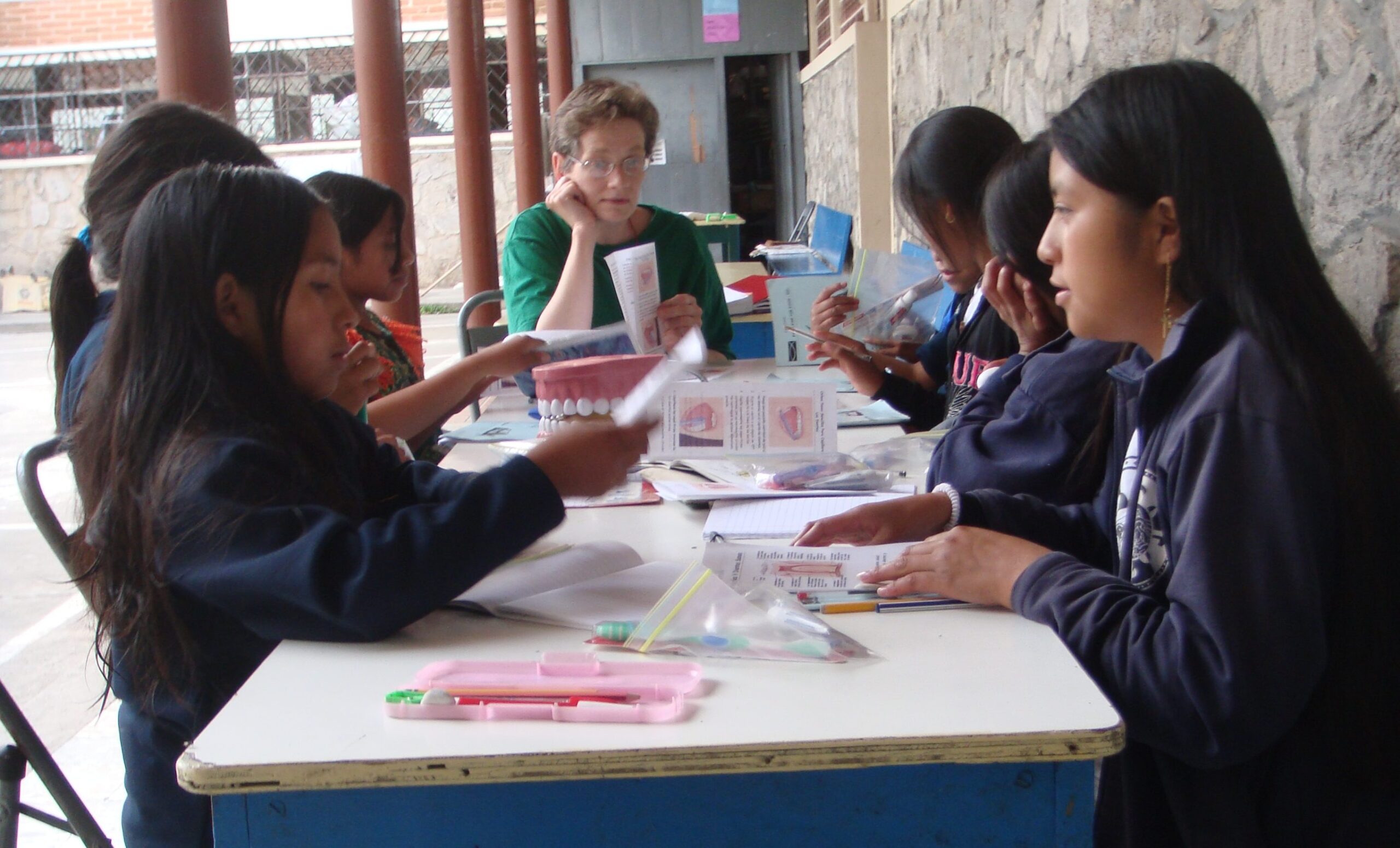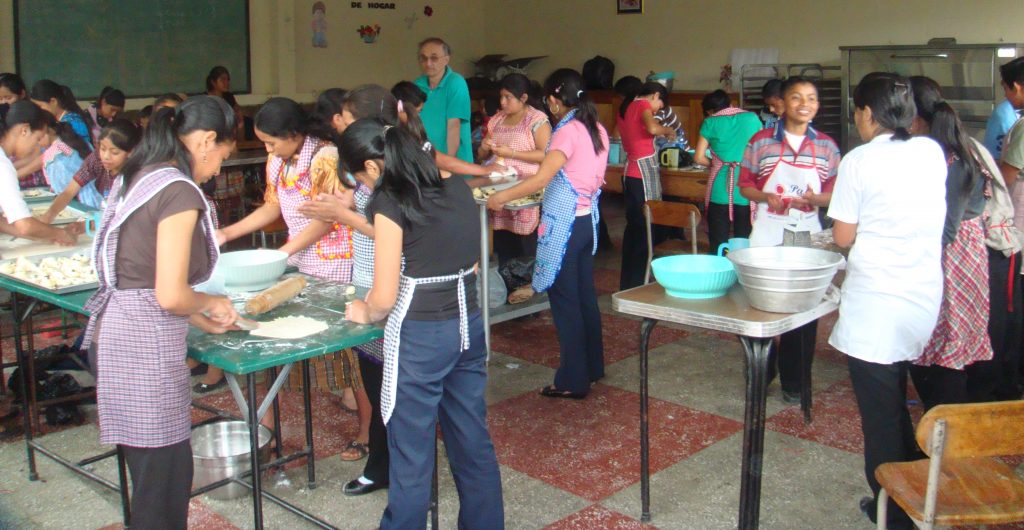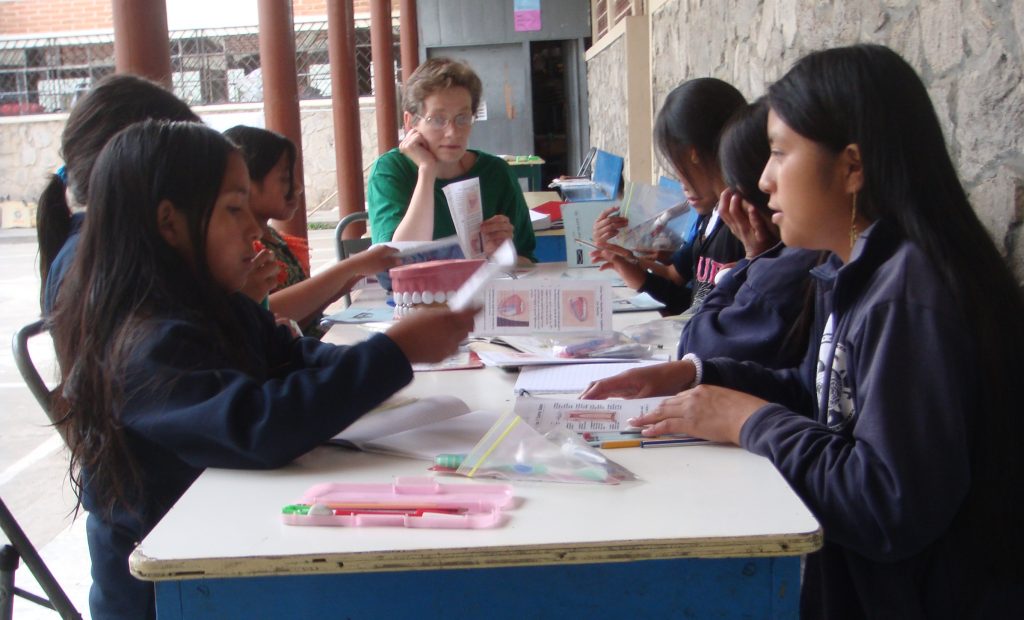Expanding Opportunities in Guatemala

CESO VA Daniel Rehak describes how a four-week assignment in Guatemala set him and his wife, VA Patricia Mulcair, on a path that has led them to create their own non-profit organization, Together Education Works.
In 2004, Patricia and I travelled on a CESO assignment to a school of over 550 students in Chichicastenango, Guatemala. We were assigned to help build a school administration system that would help keep track of enrolment, funding and grades, as well as generate annual government reports. Thinking ahead, I actually brought a computer with me–the monitor, the CPU, a hub and cables for the network…everything. No matter how bad it got, I thought, as long as we have electricity we can get going. We developed the new database with the school secretaries, Julissa and Tomasita, who made suggestions about what would and wouldn’t work for the school as we went along. In the end, we taught all the teachers how to use the database to enter marks, which alleviated work from the secretaries, and for the first time, the school had a network for things like shared printing. This was like rocket science to them. Since then, the school administration system we developed with the school has been enhanced, and it is still in use today.
CESO’s contract in Guatemala ended in 2005, but while we were there, we saw that the school needed a lot more than just an IT upgrade. We had developed a close relationship with the school in our four-week assignment, so we decided to continue on our own, helping out with whatever the school needed. The water, for instance. A lot of the students lived in a school residence, and they drank water out of five-gallon bottles that the school would buy. It’s very expensive to buy water, but you couldn’t drink it out of the tap. There was a lot of gastro-intestinal illness in the area – even I got sick!
When we went back to Canada, I thought about what we could do to remediate the water problems. I’m also a volunteer with the Ontario Water Works Association, so we came back the following year with kits from the microbiological lab and incubated samples. We didn’t find any E. coli, thankfully, but we did find a high coliform count, and this was causing the problems for the kids. We talked to the maintenance guys at the school and found that the pipes leading to the residence were over 50 years old. So we funded a project to replace the pipes. It took about two years to complete the project, and when it was done, the nuns at the residence made a decision we did not anticipate: they would no longer buy water. Now that the water coming out of the pipes was clean–the nuns still put it through a ceramic filtration system, of course–the students could drink water from the taps. Not only have GI illnesses decreased dramatically, but the money the school is saving can go towards other projects.
One year Juliana, the principal, asked us if we’d like to teach English. Chichicastenango is so isolated that if you know Spanish and a Mayan language it’s still not enough to get a job. English is very important, especially since there are a lot of call centres from the US in Guatemala City. At that point, the school didn’t have an English class at all, so we got to work developing an English program. I couldn’t find any existing English books that I liked, so I thought, “We speak English and Spanish. We’ll make our own set!” The book we developed is quite flexible. It goes all the way from ABC to basic sentence structure, enough to get the kids and teachers started. It was enough to demonstrate to Juliana that the school had to hire English teachers if the students were going to integrate with the rest of the world. The following year, she hired two new English teachers.

Daniel teaches bread-making with home economics students at Chichicastenango in 2011
We also helped out with the school’s home economics program. They had a home economics room, though they weren’t doing much cooking, and the kids were interested–in fact, they were really keen on the idea. I have some bread-making skills, so we went to the market and bought 50lb bags of flour and other ingredients and began teaching the students how to bake. We combined teaching math with cooking, since you have to understand fractions to measure out half a cup of flour, or know how many tablespoons are in a cup.
It was mostly girls in the class at first, but in the second year of the program they began introducing home economics to the boys. This was the best thing they could have done. In Guatemala, it’s mandatory to attend school up to grade 6. Many of the girls continue on to grades 7-9, but the boys usually don’t, which creates a huge economic problem. There’s also a very macho culture – the girls do what the girls do and the boys do what the boys do. The teachers agreed that if I, as a male, demonstrate to the boys that it’s okay to do this, they might be able to find employment in a bakery or restaurant one day. This would help with the massive unemployment statistics in the area.

Patricia teaches dental hygiene tips to students in 2011
After working in Chichicastenango for almost a decade, we thought we should go on to help more schools. Over the years, we funded and completed projects to do with building additional classrooms, creating school breakfast programs, teaching, promoting dental hygiene services and whatever else the schools needed. In 2016, as a result of being asked for ongoing assistance in Guatemala, we created Together Education Works, a federally-registered Canadian charity. You can see our new website here. We currently have projects at three schools in Guatemala – in Chichicastenango, Guatemala City, and Santa Cruz del Quiché–with a total of about 2,000 students. Currently, we are planning a library project and further breakfast and backpack programs. One day, we hope to expand out of Guatemala, and help schools throughout Central America.
None of this would have happened if we hadn’t said yes to the CESO opportunity in 2004.
Donate Today
Your donation helps connect businesses, governments and community organizations with the skills and support to achieve their goals and contribute to inclusive growth. When you give to Catalyste+, you empower women and drive progress in harmony with nature. You’re helping people get what they need to improve their lives and build strong communities.